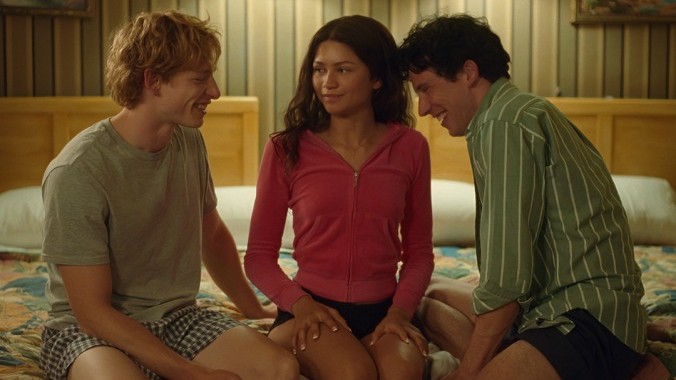‘Challengers’ Is a Tour de Force Tour Tale of 2 Simps
In the highly anticipated film, Josh O'Connor and Mike Faist grunt, grovel, and occasionally grab each other's thighs in the name of Zendaya.
Photo: Metro Goldwyn Mayer Pictures Movies
There’s a scene about thirty minutes into Challengers—Luca Guadagnino’s bonafide love letter to bisexuals everywhere—which sees the three protagonists and burgeoning tennis pros engage in a tête-à-tête about their game. At this point, spectators have only begun to learn how thoroughly fucked up these people are (and how thoroughly they’ve fucked each other). There’ll be many similar back-and-forths in the remaining 100 minutes, but you quickly sense this one is of particular significance.
Tashi Duncan (Zendaya), the 18-year-old phenom of Williams sisters’ superiority, sees tennis as more than a few rackets and some balls. It’s a conversation, she theorizes to two longtime friends—the cocksure Patrick Zweig (Josh O’Connor) and cock-not-quite-as-sure Art Donaldson (Mike Feist). Sometimes, as she says of her most recent opponent, it lasts a mere 15 seconds before one competitor puts a permanent end to it. But those aren’t the exchanges Duncan is interested in. Taking home trophies will never be enough. She’s building a brand. Zweig and Donaldson are captivated only in the way that horny young men lacking their frontal lobe are capable of…which is to say that they have no idea how much she’s just revealed about herself: Physical domination of her opponent isn’t as satisfying if she can’t also intellectually dominate them. They know how to ball (she does too), she knows Aristotle (they…don’t), etc., etc. It’s this conversation that sets the stage for the film’s three-way volley—as titillating as it is toxic—that will last over a decade.
Where sports cinema has recently either leaned toward schmaltz (Boys In The Boat) or just fallen short (Next Goal Wins), Challengers is, refreshingly, all sex, sweat, and spite. There are no good guys or slow-motion trophy raises here—just a girlboss and the “two little white boys” simping for her (and occasionally, each other). They grunt, grovel, and sometimes, grab each other’s thighs. And that’s all before they make out. By the end, I suspect everyone in the theater was prepared to be these characters’ fourth—even if they’re all exceedingly difficult to root for.
Let’s recall some recent films about the love of the game, shall we? In Iron Claw, audiences could be moved by four brothers more devoted to each other than their sport. And in Air, they could be moved by…capitalism. By contrast, Challengers is, in essence, just three absurdly hot people trying to outsmart each other. Arguably, only one is successful. There’s no sweeping score or soppy dialogue. Frankly, that’s why it’s so damn fun to disappear into it for a little while: that, and the sweat-inducing chemistry of the three leads.
-

-

-

-

-

-

-

-

-

-

-

-

-

-

-

-

-

-

-

-

-

-

-

-

-

-

-

-

-

-

-

-

-

-

-

-

-

-

-

-








































